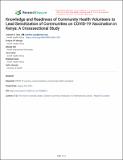| dc.contributor.author | Osur, Joachim O. | |
| dc.contributor.author | Muinga, Evelyne OF | |
| dc.contributor.author | Ireri, Edward | |
| dc.contributor.author | Carter, Jane | |
| dc.contributor.author | Kuria, Shiphrah | |
| dc.contributor.author | Hussein, Salim | |
| dc.date.accessioned | 2022-03-26T13:17:25Z | |
| dc.date.available | 2022-03-26T13:17:25Z | |
| dc.date.issued | 2021-08-02 | |
| dc.identifier.other | DOI: 10.21203/rs.3.rs-732068/v1 | |
| dc.identifier.uri | https://repository.amref.ac.ke/handle/123456789/636 | |
| dc.description | This work is licensed under a Creative Commons Attribution 4.0 International
License. | en_US |
| dc.description.abstract | Background
Vaccination is anticipated to bring the COVID-19 pandemic to an ultimate end. Community health volunteers (CHVs) are the link
between communities and the formal health system and are therefore a vital factor in successful vaccine rollout in Kenya.
However, the ability of CHVs to lead community sensitization on COVID-19 vaccination was uncertain. The aim of this study was
to assess the knowledge of CHVs on COVID-19 vaccination, and determine if their knowledge is adequate to lead sensitization of
communities in the national COVID-19 vaccination programme.
Methods
This was a mixed methods study comprising a cross-sectional survey and key informant interviews. Quantitative data were
collected from 413 CHVs in four counties of Kenya through telephone interviews; 12 key informants were also interviewed
through telephone interviews. SPSS version 25.0 and R script programming were utilised to analyse quantitative data.
Qualitative data were analyzed using MAXQDA software.
Results
Of 413 CHVs surveyed, 82.3% felt inadequately informed to engage with communities on COVID-19 vaccination. There was a
significant difference in the level of knowledge between CHVs in urban compared to rural counties (P=0.0005). The level of
knowledge was also higher among more educated CHVs compared to less educated CHVs (OR=3.04, 95% CI: 2.47-3.61; p <
0.001). Knowledge on COVID-19 vaccine was higher in CHVs who had previously received accredited training on COVID-19
(OR=1.86, 95% CI: 1.28-2.45; p < 0.001) and this had a significant influence on CHV’s willingness to be vaccinated. CHVs with
higher levels of knowledge were more likely to express readiness to engage with communities on COVID-19 vaccination than
those with lesser knowledge (P=0.0001).
Conclusion
CHVs in four counties of Kenya did not have adequate knowledge on COVID-19 vaccination which is a major constraint to their
work of mobilising communities to accept COVID-19 vaccination. | en_US |
| dc.description.sponsorship | Amref Health Africa, Amref International University (AMIU) | en_US |
| dc.language.iso | en | en_US |
| dc.publisher | Research Square | en_US |
| dc.subject | COVID-19 vaccine | en_US |
| dc.subject | Vaccine hesitancy | en_US |
| dc.subject | Community health volunteer (CHVs) | en_US |
| dc.subject | Community Health | en_US |
| dc.subject | Quantitative Data | en_US |
| dc.subject | Cross Sectional Survey | en_US |
| dc.subject | Cross Sectional | en_US |
| dc.subject | Telephone Interviews | en_US |
| dc.subject | Adequate Knowledge | en_US |
| dc.subject | Successful Vaccine | en_US |
| dc.subject | Significant Difference | en_US |
| dc.subject | Level Of Knowledge | en_US |
| dc.title | Knowledge and Readiness of Community Health Volunteers to Lead Sensitization of Communities on COVID-19 Vaccination in Kenya: A Cross sectional Study | en_US |
| dc.type | Article, Journal | en_US |

